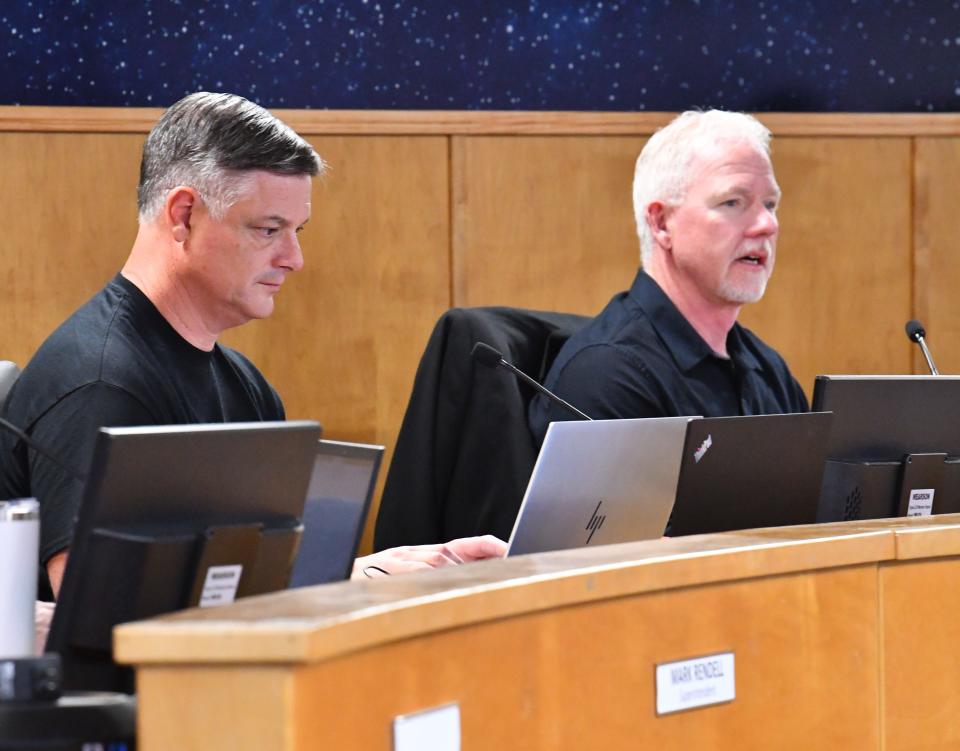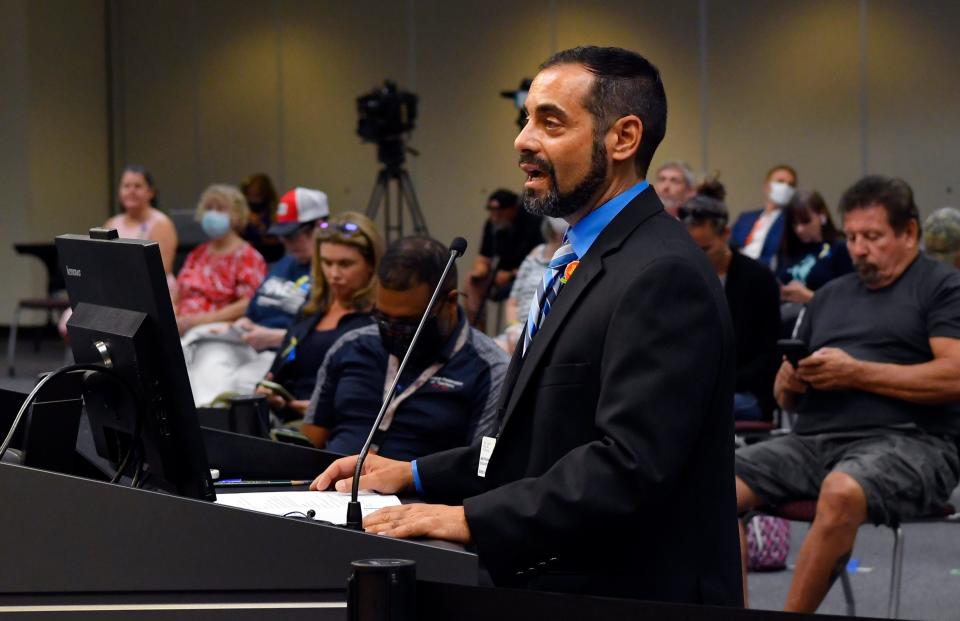Susin on higher discipline rates at Brevard Schools: 'most incredible numbers we've seen'
While overall rates of discipline at Brevard Public Schools fell between the second and third quarter of the 2023-2024 school year, the overall rates increased from the previous year, according to the district's most recent data.
At this week's board work session, members saw updated data collected through the third quarter of the 2023-2024 school year. Those numbers show that during the first three quarters, there were 72,399 discipline referrals as compared to the 61,017 referrals in the previous year's first three quarters. These referrals were given to 18,447 students, while in the previous year, they were given to 15,529 students.
Discipline rates have been a sore point since late 2022, when then-board chair Matt Susin stood outside Brevard County Jail with Sheriff Wayne Ivey and State Attorney Phil Archer, calling for a "brand new day" for discipline practices within BPS.
Since then, an audit of district discipline practices has taken place, and new procedures have been implemented. The latest data shows the numbers have gone up since last year.
Despite the jump, Susin said the latest figures, presented by student services at the work session, were the "most incredible numbers that we've seen," saying they showed the district was managing discipline issues that were previously unaddressed.
"When people are going to sit here and call out the district for saying that the discipline numbers are higher, I call farce," he said. "I say BS. I say that that's not true, and I'm willing to go on the point to say it."
While most numbers increased, the number of referrals to the alternative learning center — an option for students who would otherwise be facing expulsion — fell significantly from last year to this year.
Guardian program at BPS: As guardian program volunteers, Brevard Schools employees can be trained to carry guns

Impacts of discipline updates among administrators, staff
The discipline process has been revamped this year, with student services and the chief of schools both overseeing the process. Teachers and other staff were trained on how to report referrals, with new training requiring them to report referrals within 24 hours of the incident — a shorter timeframe than in the past.
Anthony Colucci, president of Brevard Federation of Teachers, spoke at the latest work session, saying teachers felt more supported this year than in the past by the changes made within the district.
"I think that was the biggest thing that our teachers felt that they needed ... just the recognition and the support that what I'm experiencing is real and is valid and is something that I need support with," he said. "For the most part, we feel that that has been there."
A survey of 153 school administrators conducted by student services showed that 85% of respondents felt that discipline procedures were clearer than in the past. Ninety-four percent said that when they had questions about the discipline process, they could reach someone in a timely manner.
Of the 102 bus drivers surveyed, 99% said they knew what to do if there was a "referable disciplinary event" on their bus, with 89% saying referrals are being processed faster than in the past.

Colucci said it's important for the district to "keep our foot on the gas pedal," saying that continuing with a focus on discipline — and working to fully staff classrooms — will help conditions improve for both teachers and students.
He also encouraged the district to focus on each student's individual behavioral needs.
"We need to focus on each discipline issue one at a time," he said. "One student at a time. Why is this one student not meeting classroom expectations, and what can we do to help that student meet classroom expectations? ... If we focus on the one student at a time, some of the other issues that we're seeing will correct themselves."
Activists react: 'Bad data with no plan': Discipline rates against Black students remain steady in Brevard
Student impacts and risk ratio, referrals
The total number of referrals rose from the previous year, as did the risk ratio for certain groups — a topic of ongoing concern for community members and activists.
Risk ratio is a number the state department of education uses to determine if a district is "at risk" based on the number of suspensions within a given population. The ideal number for every demographic is one, meaning everyone is at the same risk of being disciplined. A risk ratio of 2.5 is an "alert status," and a 3.0 is when action needs to take place, according to Chris Reed, director of student services. A status below 1.0 means that population is receiving fewer referrals compared to other demographics.
While the risk ratio between the second and third quarter fell slightly for multiple populations, the overall ratio for the year went up from the previous year for Black, Asian, American Indian or Alaska Native students, as well as students on free or reduced lunches. There was a fraction of an increase for English language learners.
Here's how the numbers break down:
Black students: 2023-2024 risk ratio of 2.5286; up from 2.4287 in 2022-2023
Asian students: 2023-2024 risk ratio of 0.3604; up from 0.294 in 2022-2023
American Indian or Alaska Native students: 2023-2024 risk ratio of 0.9642; up from 0.6747 in 2022-2023
Students on free or reduced lunches: 2023-2024 risk ratio of 2.6855; up from 2.5955 in 2022-2023
English language learners: 2023-2024 risk ratio of 0.7381; up from 0.7375 in 2022-2023
Native American, Asian or Pacific Islander and Black students all saw increases in the number of referrals to the alternative learning center, while those numbers fell for white, multiracial and Hispanic students. But overall referrals fell, largely due to students with substance-related offenses now having the choice to go through a drug deferral program rather than to the ALC. Last year, there were 692 total referrals as of the third quarter, while this year, there have been 523.
Susin disputed the number of ALC referrals, saying he had double-checked the data presented and that there were 760 referrals last year rather than 692. However, Russell Bruhn, a spokesperson for the district, said student services ran the data again and confirmed the 692 figure was accurate.
There was also an increase in both substantiated and unsubstantiated bullying from last year. In 2022-2023 through the third quarter, there were 103 substantiated bullying incidents and 269 unsubstantiated bullying incidents. This year through the third quarter, there were 135 substantiated bullying incidents and 425 unsubstantiated incidents.
Finch Walker is the education reporter at FLORIDA TODAY. Contact Walker at [email protected]. X: @_finchwalker.
This article originally appeared on Florida Today: Brevard Schools: Most recent data indicates higher rates of discipline
